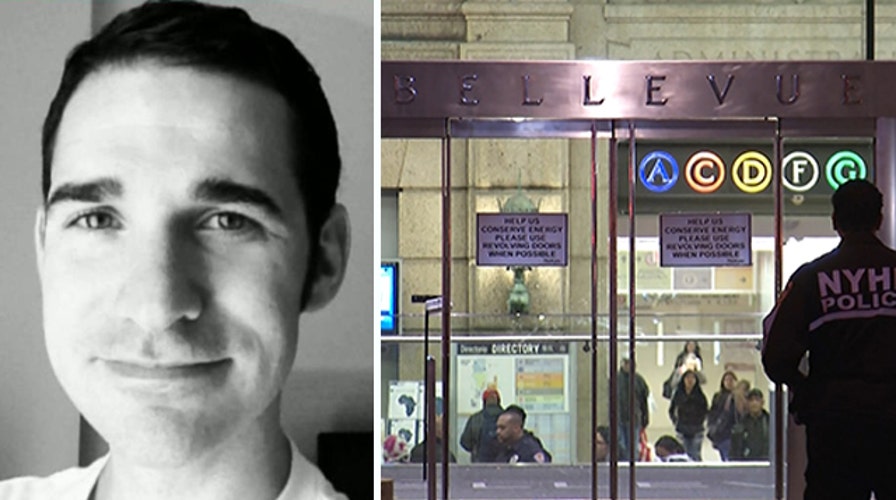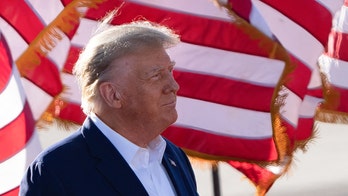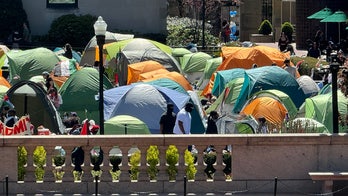Ebola infected doctor entering next phase of illness
Bryan Llenas reports from Bellevue Hospital
New York Gov. Andrew Cuomo admitted Saturday that the 21-day Ebola quarantine policy for health care workers returning from West Africa could be unenforceable.
The New York Daily News reported that the Democrat acknowledged that several contingencies had not yet been worked out by officials, including what would happen if someone refused to be quarantined or even where they would spend their time during the watch period.
"Could you have a hostile person who doesn’t want to be quarantined?" Cuomo said during a campaign appearance in the New York City borough of Queens Saturday. "I suppose you could. But that hasn’t been the case yet." The governor added that officials had not determined whether those refusing to be quarantined could face arrest or prosecution, saying "It's nothing that we've discussed, no." When asked by the News where the quarantined people would be held, Cuomo even seemed unclear on that point, saying "Some people could be quarantined in a hospital if they wanted to be."
On Friday, Cuomo and his New Jersey counterpart, Chris Christie, imposed a mandatory quarantine of 21 days — the incubation period of the deadly virus — on travelers who have had contact with Ebola patients in the countries ravaged by Ebola — Liberia, Guinea and Sierra Leone. A similar measure was announced in Illinois, where officials say such travelers could be quarantined at home.
Doctors Without Borders executive director Sophie Delaunay complained Saturday about the "notable lack of clarity" from state officials about the quarantine policies, and an American Civil Liberties Union official in New Jersey said the state must provide more information on how it determined that mandatory quarantines were necessary.
"Coercive measures like mandatory quarantine of people exhibiting no symptoms of Ebola and when not medically necessary raise serious constitutional concerns about the state abusing its powers," said Udi Ofer, executive director of the ACLU of New Jersey.
Health officials in all three states with quarantine policies did not return messages from The Associated Press seeking details about enforcement Saturday.
Meanwhile, Kaci Hickox, the first traveler quarantined under Ebola watches in New Jersey and New York, wrote the first-person account for the Dallas Morning News, which was posted on the paper's website Saturday. Her preliminary tests for Ebola came back negative.
"This is not a situation I would wish on anyone, and I am scared for those who will follow me," Hickox wrote of her quarantine. "I am scared about how health care workers will be treated at airports when they declare that they have been fighting Ebola in West Africa. I am scared that, like me, they will arrive and see a frenzy of disorganization, fear and, most frightening, quarantine"
"One after another, people asked me questions," Hickox continued. "Some introduced themselves, some didn’t. One man who must have been an immigration officer because he was wearing a weapon belt that I could see protruding from his white coveralls barked questions at me as if I was a criminal ... The U.S. must treat returning health care workers with dignity and humanity."
Doctors Without Borders said Hickox has not been issued an order of quarantine specifying how long she must be isolated and is being kept in an unheated tent. It urged the "fair and reasonable treatment" of health workers fighting the Ebola outbreak.
"We are attempting to clarify the details of the protocols with each state's departments of health to gain a full understanding of their requirements and implications," Delaunay said in a statement.
Christie, campaigning Saturday in Iowa for a fellow Republican, said he sympathizes for Hickox but said he has to do what he can to ensure public health safety.
"My heart goes out to her," the governor said, while also noting that state and local health officials would make sure quarantine rules are enforced. He said the New Jersey State Police won't be involved.
The quarantine measures were announced after a New York physician, Craig Spencer, working for Doctors Without Borders returned from Guinea was admitted to Manhattan's Bellevue Hospital Center earlier this week to be treated for Ebola.
A senior White House official said Saturday that how to treat health care workers returning from the affected West African countries continues to be discussed at meetings on Ebola as the administration continues to take a "careful look" at its policies.
The Associated Press contributed to this report.





